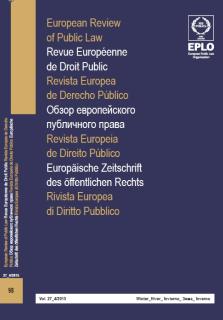
Constitutional Law / Droit constitutionnel
Serbia / Serbie
Associate Professor, Union University Law School, jelena.jerinic@pravnifakultet.rs
The text is a brief presentation of the Serbian Constitutional Court’s ruling on the constitutionality of a law passed in 2014 to reduce the burden on the state budget imposed by pension payments, as part of the Government’s austerity measures. The Constitutional Court, by a tight majority, in September 2015, dismissed the initiatives for the constitutionality review of this law, finding that the Serbian Constitution only guarantees the right to pension insurance and that the right to pension is a right regulated by law and that, consequently, pensioners are not guaranteed a right to a certain amount of pension. It also held that, by protecting a larger group of pensioners from reduction of pensions, the state abided by its constitutional obligation to take care of the pensioners’ economic security. The dissenting judges, on the other hand, held that the Court should not have ended the procedure with a non-mandatory decision, but that a full proceeding with a public hearing should have taken place. By deciding with a procedural ruling, the Constitutional Court missed the opportunity to position itself toward a more general, doctrinary issue concerning state intervention in the wider area of socio-economic rights and social security. During the upcoming year, the Serbian Constitutional Court will have to deliver its decisions on at least three more laws passed within the Government austerity scheme, while the European Court of Human Rights will deal with this case, since applications will be submitted to it by Serbian pensioners’ associations.
Ce texte présente brièvement l’arrêt rendu par la Cour constitutionnelle serbe relativement à la constitutionnalité d’une loi adoptée en 2014 afin de réduire la charge du budget de l’Etat imposée par le paiement des pensions, dans le cadre des mesures d’austérité prises par le gouvernement. En septembre 2015, la Cour constitutionnelle a rejeté, à une courte majorité, les initiatives de contrôle de la constitutionnalité de cette loi, estimant que la Constitution serbe garantissait seulement le droit à l’assurance retraite et que le droit à une pension était un droit régi par une loi et que, par conséquent, les pensionnés n’avaient pas de garantie d’un droit à un certain montant de pension. Elle a également déclaré qu’en protégeant un groupe plus large de retraités contre une réduction des pensions, l’Etat respectait son obligation constitutionnelle de veiller à la sécurité économique des retraités. D’un autre côté, l’opinion dissidente a déclaré que la Cour ne devait pas mettre fin à la procédure par un arrêt non contraignant mais qu’une procédure de plein contentieux, avec une audience publique, aurait dû avoir lieu. En décidant sur la procédure, la Cour constitutionnelle a manqué l’occasion de se positionner face à un problème doctrinal plus général concernant l’intervention de l’Etat dans l’espace plus large des droits socio-économiques et de la sécurité sociale. Durant l’année à venir, la Cour constitutionnelle serbe aura à statuer sur au moins trois autres lois adoptées dans le cadre du plan d’austérité du gouvernement, tandis que la Cour européenne des droits de l’homme examinera ce cas, puisque des requêtes seront introduites devant elle par des associations de retraités serbes.





















